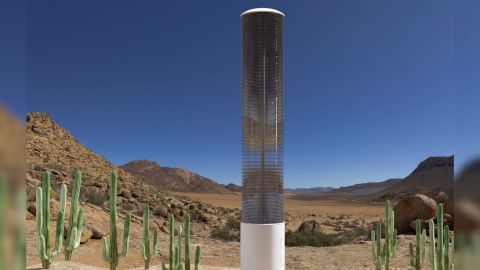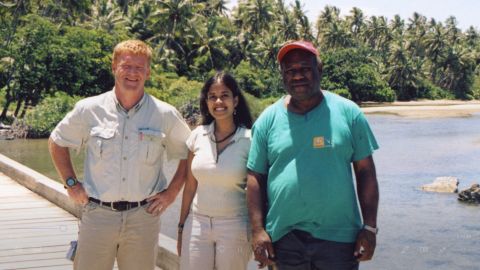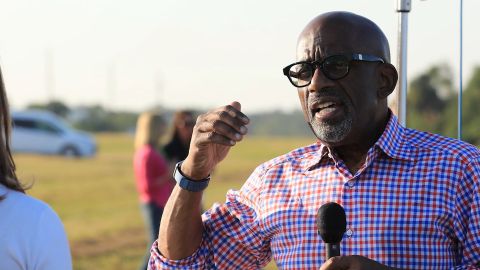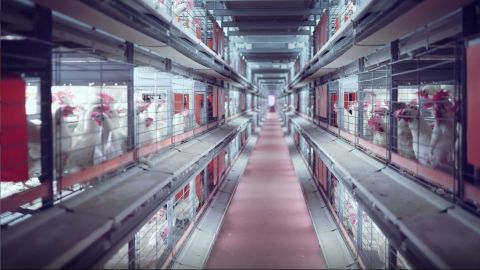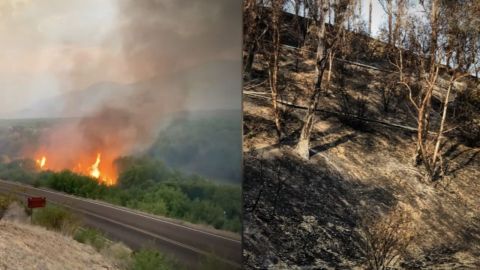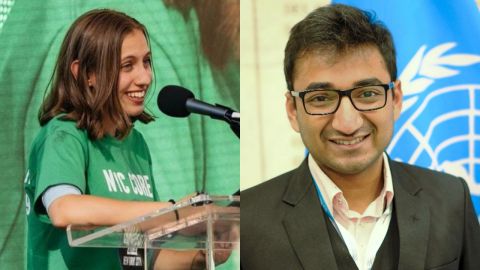A powerful new movement is gaining traction.
One built on environmental equity, justice and
inclusion, a leader of the movement and a young
changemaker will tell us how they're changing the
culture to move the planet forward.
Hi, everyone.
I'm Frank Sesno and welcome to Planet Forward
from the George Washington University, produced in
association with the Global Futures Laboratory
at Arizona State University.
In this season of reckoning, we've got to
change the culture around the way we consider
climate change, sustainability,
environmental equity and inclusion.
The Reverend Lennox Yearwood Jr. is in a
league all by himself in that regard.
He's founder of the Hip Hop Caucus, a minister, a
community activist, an Air Force vet.
He's got a quick wit, sharp eye and knows what's
happening down the street and around the world
because he's a climate change negotiator and a
storyteller.
And he's doing everything in his power to mobilize
young hip hop artists and anyone who will listen.
Hey Rev., thanks for joining us.
Man, great to be here.
The planet and our politics are on fire.
What do you make of this mess we got going now.
Our generation is not only fighting for equality,
we're fighting for existence.
And this is our lunch counter moment for the
21st century, which is tough because that's hard
for a lot of young people to kind of take that in.
In the 60s, young people, they saw that the lunch
counters throughout this country were segregated.
And they knew that was wrong.
They knew that the idea of white supremacy had to
end.
And so young students went to the Woolworths' counter
and they sat there and demanded that young people
of color get served.
And they they took it.
They were nonviolent.
And they took beatings.
They got coffee poured on them.
And literally the lunch counter became a
galvanizing tool to show this country at that time
that racism and segregation was wrong.
And you're saying that's what we got now, the
equivalent with the environmental movement,
that this is our lunch counter moment?
The climate crisis is our lunch counter moment for
the 21st century.
Climate justice is racial justice and racial justice
is climate justice.
Those who are first and worst impacted are
communities of color.
Black, and indigenous, and people of color are the
ones who are hit hardest by the climate crisis.
And there is also this real this kind of
extractive mentality, this kind of mentality, this
take, this greed, this putting forth profits
before people.
That that doesn't work for humanity.
And so they're realizing that to literally deal
with this, they are now breaking down the silos.
Our movement for many years has been a siloed
progressive movement in which you had women's
rights in this bucket.
Environmentalism in this bucket.
Gay rights in this bucket.
Whatever it was in their own bucket.
And they're saying that doesn't work because the
same entity that is causing us all problems,
that we need to come together and fight it.
And so now we're breaking down the silos, coming
together and now moving it forward.
So now when you hear about the movement for Black
lives, it also engages and includes queer lives,
you're about queer lives, you're about women's
rights, women's rights about climate change and
climate justice, because they're all connected.
I want to talk about trouble in the water.
What are you doing with this?
So trouble in the water, we realize that listen,
that the conversation around the Flint water
crisis and lead is something that even people
within Flint didn't quite understand.
And we were able to do a video that began to talk
about the water crisis, not just in Flint, but
also in this country and about what we can do to
solve it.
And again, connect the dots.
Let me ask you about another project you're
working on: it "Ain't Your Mama's Heat Wave." Oh,
that's actually a comedy special.
We actually have a number of comedians who go down
to Norfolk to study the climate crisis.
What's happening in Norfolk is it's actually
below sea level, it's sinking, it's very much
like New Orleans.
And so we went down there to use comedy.
"That water get too high.
All y'all hair, you're going to have to be
natural." We figured if they were laughing about
it, then they may want to be involved with it as
well.
And so "Ain't Your Mama's Heat Wave" is just that.
It's a funny comedy special that's coming out
soon.
You can check it out at Think 100 percent, Think
100 climate.com to get more information.
Tell me how you find humor in climate change.
"Kids get older, you buy them cars.
Now, I'm just trying to think about riding a kayak
down Church Street.
You know what I mean?"
Comedy is a great way of shedding a light on
somethings that are very hard to deal with.
Comedians like Dick Gregory and Richard Pryor
and Moms Mabley in the past, you know, they were
allowed to actually break down walls because
communities who heard them for the first time like,
"Wow.
I didn't think of it that way.
I never would have thought that was even funny." And
now we're doing the same thing with climate.
How do you, as a storyteller, make this
issue of climate resonate with young people of
color?
A lot of times the climate movement has been kind of
a Birkenstock movement.
Right?
And so they need to broaden and give it a
little bit of soul, a little bit of rhythm.
And so that's what I try to do because ultimately,
the only way we win this is by broadening this
movement.
Is it working?
You know, I think it is working.
I would say this, though.
One thing that I realized is that, you know, people
have asked me to bring culture to the climate
movement, but the climate movement has a culture
already.
And I think that they have to deal with that.
And they are comfortable seeing sometimes
predominantly men, but I mean white men.
That's what people have gotten used to seeing.
And I think that we have to change that culture.
So they've got to begin to see different voices
discussing this.
And I think that's where our success and where we
are beginning to see success.
It's a process.
It's really to have more faith in young people in
that regard.
I think that they realize the crisis.
I mean, they see it.
And I think that what we've seen is that we
could just kind of get out the way and let young
people tell their story that it has a huge impact.
And so we've seen that as well.
I think that we saw this throughout history in the
Civil Rights movement when we had like a young
Dr. King who would get up there and talk these
things.
But then while he was speaking, you also had
Fannie Lou Hamer, who would say that I'm sick
and tired of being sick and tired.
And so I think that's the power of storytelling.
In your your Hip-Hop Caucus 20/20 report, you
say think one hundred percent is about justice,
solutions and realness, and it isn't depressing.
What's not to be depressed about?
So this is for me as a Black man in this country,
you know, I can look back at times and wonder how in
the world the people were taken from Africa, put on
boats, came to this country 401 years ago,
beaten, raped, forced into labor.
How could those people have any semblance of
hope?
You've got to have a mentality that despite all
that is coming at you, that we shall prevail.
We shall overcome.
We shall make it.
We will weep.
We will cry.
And we even, we may even succumb.
But we can't ever give up hope.
And I think that's the mentality this climate
movement must have, that we have wildfires, we have
droughts, we have floods, we have devastation.
Man, it looks that we can't handle it no more.
But I believe this, where we have organized people,
you can make it happen.
I want to just thank you so much for everything you
do for the fight, that you fight, for the
inspiration.
Thank you.
Thank you.
Changing the culture means changing the narrative and
Planet Forward correspondent Francesca
Edralin is trying to do just that.
A student at George Washington University
majoring in international relations and minoring in
journalism and sustainability.
She grew up in New Jersey, but her family's roots are
in the Philippines.
And that gives her what she calls a global lens to
try to understand how climate change
disproportionately impacts the poorest countries.
Hey, Francesca, welcome.
Hi, Frank.
Thanks for having me.
Well, glad you're here.
Hey, listen, on your Planet Forward bio, your
profile page, you write that your Filipino
background gives you a global lens and helps you
really understand and want to focus on the
disproportionate impact that climate change has on
poor countries around the world.
Where do you see that impact playing out?
And why do you think it's so important that you tell
these stories so that people know what's going
on there?
Yeah, so I see these impacts in my home
country, in the Philippines, which is an
archipelago that is severely at risk from sea
level rise and increasing cyclones.
And just by doing my own research, I see countries
around the world struggling from drought,
flooding, natural disasters, especially
countries in the global south.
And these are countries that produce far less
emissions than wealthier countries, but
unfortunately are impacted the hardest by the climate
crisis.
As a Planet Forward correspondent, I want to
tell underreported environmental stories from
around the world about places that are
experiencing severe environmental conflicts.
So during my internship this summer as a reporter
for Mongabay- Mongabay is an awesome news site that
focuses on environmental stories from around the
world.
And I got the chance to interview an indigenous
environmental leader from Costa Rica.
He talked to me about how his people are handling
COVID-19 and how they predicted a pandemic like
COVID-19 would occur in our lifetime because of
all the global environmental destruction
that's happening recently.
The article that I wrote about the Peccary species
decline actually made it to Mongabay's list of most
read articles in July.
It amassed over forty thousand views.
And I'd like to think that my Philippine's article
made an impact, too.
As one of the community activists who I
interviewed for my article was very excited to use my
article for his border protection campaign.
After my article was published, he even emailed
me saying that he sent my piece to the Philippine
Senate on the Environment, hoping that my work will
help sway the committee's decisions in his favor.
And hearing that was so amazing to me.
What do you want to do, change or accomplish in
your life?
There's so much that I want to do to contribute
to the environmental movement.
I want to visit as many countries as I can to
document and produce stories on the impacts of
climate change firsthand.
I also want to help increase global awareness
and media attention on the environmental stories and
conflicts of the world that are currently
underreported, such as on environmental equity, the
intersections of gender equality and climate
justice, the importance of including indigenous
voices in the climate movement.
And the list really goes on.
There's just so much to learn, so much to write
about, so much to advocate for.
And it's these stories that I want to tell and I
want to make that impact.
So that's why I'll be an environmental storyteller
for life.
Francesca, thank you so much.
Good luck.
We'll be watching and reading.
Thank you.
Thanks for having me, Frank.
Unless we change the culture and think and
act differently, climate change is only going to
make global inequalities worse.
That's why we need people like the Rev and Francesca
to tell the stories and open our eyes and open our
minds.
I'm Frank Sesno for the George Washington
University, the Global Futures Lab and Planet
Forward.
Thanks for watching.

